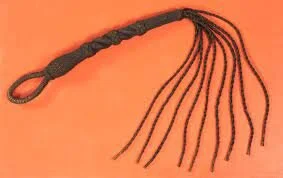PRELIMINARY NOTE TO MY READERS: I am pleased to announce that my Trauma and Philosophy blog has been selected by Feedspot as one of the Top 50 Trauma Blogs on the web. Here is the link to the full list: https://blog.feedspot.com/trauma_blogs/
* * * * * * * * * * * * *
In the end, the law is to be understood as the limit beyond which lies Death.
There is no freedom without love: a freedom without love is centered on the desire of the individual, on the spirit of power, on one’s personality: it is slavery [...].
— Jacques Ellul
You shall not!
Why not?
Because some pompously pontificating potentate in the sky says so? Some universal dictator? Some super-surveilling, omniscient, omnipresent coercive intelligence? A hyper-cosmic ruler demanding that his orders be followed to the letter? Maybe even some über-employer managing all his human resources for maximum profit to himself?
Why obey the law or any commandments?
For fear of punishment if we don’t, like slaves?
In hopes of rewards if we do, like household servants?
Or is all genuine obedience rendered solely out of love, the way an adoring child might seek to please a beloved parent?
At any rate, what’s freedom got to do with laws and commandments, and with obedience to them?
Well, let’s see . . .
* * *
Love presupposes freedom. Coerced love is a contradiction in terms. Nothing done under duress, either pressure from others or pressure from one’s own passions, is done out of love.
If I do something in hopes of reward, I am not doing that thing out of love. I’m simply trying to profit from doing it. My motives are selfish.
If I do something because I fear punishment if I don’t do it, then my motives are once again selfish: I am trying to avoid such punishment.
Neither the pursuit of personal pleasure nor the avoidance of personal pain enacts love. Love seeks no gain, and willingly endures pain if that is necessary for remaining truthful to love’s calling. If one obeys the call of love, one does not calculate potential profits and loses before one commits oneself.
Love, after all, calls us to act in loving ways, which is to say in ways that seek the good of the beloved for the beloved’s sake, not for our own. Love so commands us.
To hear that command of love with any clarity, we must first be released from enchainment to our impulses. We must be free of such chains, if we are to be able truly to listen and hear what love commands us to do, and then to heed that command.
Why should we heed love’s command, once we do hear it?
Out of love, of course. Love leaves us no choice but to obey. Otherwise, we relinquish the very freedom that love presupposes.
What’s more, if we are truly free, we will indeed hear and heed the commandment to love. Just as love presupposes freedom, so does freedom in turn presuppose love. If one does not love any other—that is, if does not seek the good of that other solely for that others own sake — then one simply remains a slave to one’s own whims and passions.
In sum, whoever is without freedom is without love, and whoever is without love is without freedom. The two are as inseparable as a pair of lovers.
* * *
A gap may be bottomless, making it an abyss (from Latin a- "without" + byssos "bottom”). However, it is no gap at all if it is not a gap between two things, such as two rock faces. If the gap had no such limits, it would be without any definition, an altogether in-definite or in-determinate gap—which is to say, no gap at all. The absence of all limits, all boundaries, all facets or faces, is the absence of all being. In that sense it is in-finite, “without limits.” Whatever may be “infinite” in that sense, however, “is” not at all—not even present as an absence, as a sort of gaping abyss. Even God, if God is infinite, must be so in some other sense of that term, if God is in any sense to be. God, if God both is and is infinite, would have to be infinite in some other direction — some other “dimension” — as it were.
* * *
A limitless freedom is really no freedom at all. It is sheer license, which is a different thing altogether. To be without limits in doing whatever enters one’s head to do is to be licentious, not free. To be free, one must respect the limits beyond which “doing as one wishes” degenerates into such licentiousness, which is just another form of enslavement: sheer enslavement to one’s own impulses.
The limits of freedom are the points beyond which one passes from freedom into enslavement, even — indeed, especially — when that enslavement is to one’s own passing whims and wishes, rather than to some external master. Slavery remains slavery, no matter who or what cracks the whip.
Licentiousness returns one to Egypt, even if one never leaves Iowa.

